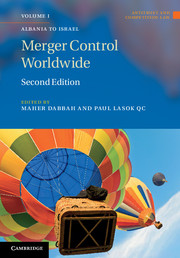Book contents
- Frontmatter
- Contents
- Preface
- List of Contributors
- Table of cases
- Table of Legislation and Official Guidance
- Introduction
- Albania
- Argentina
- Armenia (Republic of Armenia)
- Australia
- Austria
- Barbados
- Belgium
- Bosnia and Herzegovina
- Brazil
- Bulgaria (Republic of Bulgaria)
- Canada
- Chile
- China*
- Costa Rica
- Croatia
- Cyprus (Republic of Cyprus)
- Czech Republic
- Denmark
- Estonia
- European Economic Area
- European Union
- Finland
- France
- Germany (Federal Republic of Germany)
- Greece
- Hong Kong
- Hungary
- Iceland
- India
- Indonesia (Republic of Indonesia)
- Ireland
- Israel
- Italy
- Japan
- Kenya
- Korea
- Latvia
- Lithuania
- Macedonia (Republic of Macedonia)
- Malta
- Mexico
- Netherlands (The Netherlands)
- New Zealand
- Norway
- Pakistan
- Peru
- Philippines (Republic of the Philippines)
- Poland
- Portugal
- Romania
- Russia
- Serbia
- Singapore
- Slovakia (Slovak Republic)
- Slovenia
- South Africa
- Spain
- Sri Lanka
- Sweden
- Switzerland
- Taiwan
- Thailand
- Tunisia (Republic of Tunisia)
- Turkey
- Ukraine
- United Kingdom
- United States of America
- Uzbekistan
- Venezuela
- Zambia
- Index
Romania
Published online by Cambridge University Press: 05 November 2014
- Frontmatter
- Contents
- Preface
- List of Contributors
- Table of cases
- Table of Legislation and Official Guidance
- Introduction
- Albania
- Argentina
- Armenia (Republic of Armenia)
- Australia
- Austria
- Barbados
- Belgium
- Bosnia and Herzegovina
- Brazil
- Bulgaria (Republic of Bulgaria)
- Canada
- Chile
- China*
- Costa Rica
- Croatia
- Cyprus (Republic of Cyprus)
- Czech Republic
- Denmark
- Estonia
- European Economic Area
- European Union
- Finland
- France
- Germany (Federal Republic of Germany)
- Greece
- Hong Kong
- Hungary
- Iceland
- India
- Indonesia (Republic of Indonesia)
- Ireland
- Israel
- Italy
- Japan
- Kenya
- Korea
- Latvia
- Lithuania
- Macedonia (Republic of Macedonia)
- Malta
- Mexico
- Netherlands (The Netherlands)
- New Zealand
- Norway
- Pakistan
- Peru
- Philippines (Republic of the Philippines)
- Poland
- Portugal
- Romania
- Russia
- Serbia
- Singapore
- Slovakia (Slovak Republic)
- Slovenia
- South Africa
- Spain
- Sri Lanka
- Sweden
- Switzerland
- Taiwan
- Thailand
- Tunisia (Republic of Tunisia)
- Turkey
- Ukraine
- United Kingdom
- United States of America
- Uzbekistan
- Venezuela
- Zambia
- Index
Summary
RELEVANT LEGISLATION AND STATUTORY STANDARDS
The Competition Act
The principal rules on merger control in Romania are laid down in the Competition Act No 21/1996 as republished in 2005 (‘Competition Act’) and incorporating the amendments introduced by Emergency Governmental Ordinance No 121 of 4 December 2003. No further amendments to the Competition Act have been made after its republication in August 2005.
The Competition Act delineates the main rules regulating merger control and includes some of the principles set forth in the Council Regulation (EU) No 139/2004 of 20 January 2004 on the control of concentrations between undertakings (the EU Merger Regulation, hereinafter ‘EUMR’).
A draft law introducing amendments to the Competition Act (‘Competition Draft Law’) is currently open for consultation with a view to further aligning Romanian legislation with European competition law. Some of the proposed amendments are for clariication purposes only, while others introduce concepts new to the Romanian legal framework.
Secondary legislation
Relevant guidelines for the enforcement of the Competition Act are set forth in the enactments issued by the Romanian Competition Council (‘RCC’):
regulation of 29 March 2004 on the authorisation of economic concentrations (‘Merger Regulation’);
instructions on remedies acceptable in cases of conditional authorisation of economic concentrations (‘Remedies Guidelines’);
- Type
- Chapter
- Information
- Merger Control Worldwide , pp. 1158 - 1182Publisher: Cambridge University PressPrint publication year: 2012



